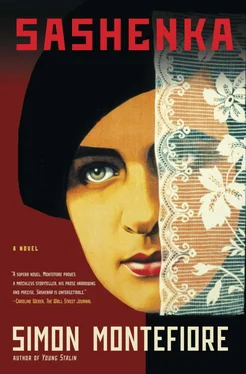Vera droned on with her complaints: the morning sickness was gone but her back ached and she could not sleep. The doorman made comments about Gideon’s carryings-on. Vika had told her friends that her father was a revolutionary and a drunkard; Mouche was insubordinate and rude, the teachers complained about her and she was growing out of all her boots and dresses. But there was no money; it was hard to get meat in the shops and impossible to find bread; the neighbors had heard from someone else in the building that Gideon had been seen drunk in the early hours in the Europa Hotel; and how did he think that made her feel?
A full belly never made Gideon sleepy; it went straight to his loins. It fortified his libido. For some reason, he cast his mind back to the lunch last week at his brother’s house. The Lorises were famous for their happy marriage but the boring count was not at the lunch so Gideon had given Missy what he called the Gideon Manifesto: let us pleasure ourselves now for life is short and tomorrow we die. (Obvious as it was, the manifesto was surprisingly successful!) Now Gideon recalled how, as he was saying good-bye to Missy, she had looked into his face with her crinkly, twinkling eyes—her laughter making creases around them—and squeezed his hand unmistakably, saying, “It would be wonderful to talk more about Meyerhold and the new theater. I suppose you won’t be at Baroness Rozen’s at the Astoria on…,” and she named a date. It happened that it was tonight. Gideon had neglected to follow up—but now his refreshed and well-fed phallus, a brilliant interpreter of female intentions, stirred. He had to get to that party right away.
Missy had never paid him the slightest attention. She was worldly enough—she had to be open-minded to be friends with Ariadna. But she had never really flirted with anyone and certainly not with him. Gideon reflected that the war, the loss of respect, the ever-changing ministers and the disturbances on the streets must be shaking free some ripe fruit that would never otherwise have fallen to the ground. He thought about Missy Loris’s body—that bobbed blonde was skinny and had no bosom—yet he suddenly hungered for the sheer unadulterated joy of tasting new skin, lips, the satin of her inner thighs. He smiled to himself: this ursine giant was capable of Herculean erotic feats that no one—except the women themselves—would have believed possible. He proposed the most deliciously outré acts of lovemaking in delicate French phrases that liberated the restraint of chorus girls and countesses alike. Yet he had never become complacent about this erotic success. Why did these lovely bubelehs , these babes, choose me? he thought. Me? Of all people! I’m an ugly brute—like a Jewish innkeeper! But what the hell, I’m not complaining!
He just could not help himself: he had to find Missy right away that night. But if he handed over the two hundred rubles to Vera now, he would have nothing to buy the ladies drinks and snacks. What to do? He groaned. He’d do what he always did.
Moments later, as Vera washed up morosely, Gideon fled, leaving a hundred rubles on the hall table and keeping the rest for himself. Mouche helped him pull on his felt boots and handed him “our Menshevik article!” while Vika shook her head, pursing her lips.
“You’re leaving already, Papa? I knew it. I knew it. I knew it!”
“We’ll change the locks, you deadbeat!” shouted Vera, but he was gone.
Outside in the streets, Gideon could not find a sleigh. As for Vera, the whiner would manage, he thought. Vera and Vika: what a pair of sourpusses! I’m a coward, an incorrigible shameful hedonist—but I’m so happy! Dizzy with anticipation! What’s wrong with happiness? We make our own lives! What are humans? We’re just animals. I’ll die young. I won’t make old bones so I’m just doing what my species does. Besides, I had to go! I have an article to deliver to the newspaper.
He smelled the icy air. Strange sounds echoed in the distance. Gunshots crackled, factory whistles sang, engines revved and screeched, voices chanted—but here all seemed oddly quiet. But as he strode toward the Astoria Hotel, his mind racing with the anticipation of Missy’s bare shoulders, her soft belly, her smells of female sweat and perfume, he stepped out into the wider streets. It started as a murmur, became a throbbing and grew into a roar. The broad boulevards were filling with masses of people, their covered heads and heavy coats making padded bundles of them as if they were automata all marching in the same direction.
Gideon weaved in and out, sometimes letting the current carry him, sometimes standing aside and watching it rush past. He was excited. As a writer, he was witnessing something. But where was the army, the Cossacks?
He stepped into the hotel, home again among its gleaming parquet floors, the shiny gold and black elevators, the dark oak bar.
“The usual, Monsieur Zeitlin?” asked Roustam the barman. Inside the Astoria, the polished formality had given way to a wild and carefree holiday. Tossing his coat and hat at the hat-check girl and forgetting to remove his boots, Gideon padded toward the private room where Baroness Rozen was holding a soirée. A girl in a backless orange dress, a feather boa and yellow shoes—what Vera called a woman of easy virtue, but what Gideon affectionately called a bubeleh —hailed him like an old friend, and he beamed at her. She was holding a drink and offering him a sip. The receptionists laughed at her: were they drunk too? A couple, an officer and what appeared to be a respectable lady wearing a double rope of pearls, sat kissing on the sofa in the foyer as if they were in a kabinet , not a public place. A doorman opened the double doors to the party and Gideon noticed that the red-faced servant did not bow, just smirked as if he knew what was inside Gideon’s head.
Gideon almost fell into the room, pushing through uniforms and shoulder boards, frock coats and gowns, hearing them discussing the situation in the streets—until he saw a helmet of blond hair, some pale shoulders and a long gloved arm with a gold-tipped cigarette and the smoke curling round above it like a snake from a basket.
“So you came,” Missy Loris said in her American accent.
“Was I meant to?”
Her smile raised those comely laughter dimples in her cheeks. “Gideon, what’s happening out there?”
He put his lips to her little high-set ear. “We could all die tonight, bubeleh ! What shall we do in our last moments?” It was one of his favorite lines from the Gideon Manifesto, and any moment now it was going to work.
There were no cabs at the Finland Station when Sashenka arrived back in the city. There was hardly anyone on the train except for two old ladies, probably retired teachers, who were earnestly discussing whether the Thirty Abominations , a lesbian novel from before the war, by Lidia Zinovieva-Annibal, was a classic exposition of female sensuality or a disgusting unchristian potboiler.
The argument started politely enough but as the train pulled into the Finland Station the two ladies were shouting at each other, even cursing. “You philistine, Olesya Mikhailovna, it’s pornography plain and simple!”
“You hidebound reptile, Marfa Constantinovna, you’ve never lived, never loved, felt nothing.”
“At least I feared God!”
“You’ve so upset me, I’m having a turn. I need my pills.”
“I won’t give them to you until you admit you’re being utterly unreasonable…”
Sashenka could only smile as she heard the ricochet of gunshots over the city.
The station was eerily empty of its tramps and urchins. Outside, it was dusk but the streets were filled with running people, some with guns. It was snowing again, big dry flakes like barley seeds; the half moon cast a lurid yellow light. Sashenka thought the people looked oddly swollen but realized that many were wearing two coats or padding to fend off the knouts of the Cossacks. A worker from one of the vast metal factories told her there was a standoff at the Alexander Bridge, but before she could ask any more there was shooting and everyone began to run, unsure what they were running from. A female worker from the Putilov Works told her there had been battles on Alexander Bridge and Znamenskaya Square; that some of the Cossacks, the Volynsky Guards, had changed sides and charged the police. An old drunk claimed he was a socialist but then tried to put his hand into Sashenka’s coat. He squeezed her breast and she slapped him and then ran. On the Alexander Bridge, she thought she saw the bodies of policemen. There were no streetcars.
Читать дальше












